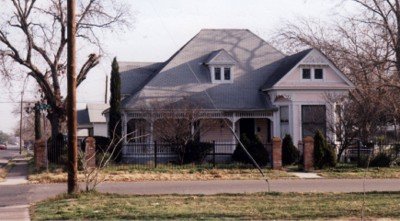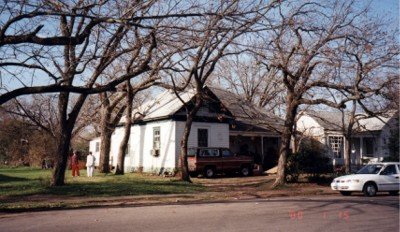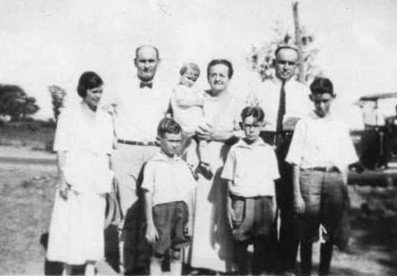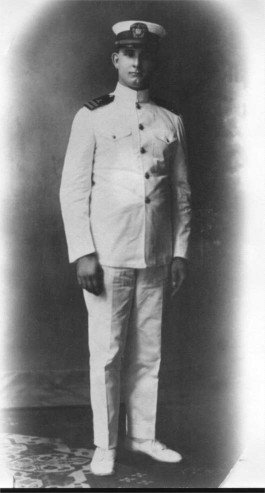
This will be an abbreviated view of growing up, beginning with my birth, Oct. 16, 1922, in Waco, Texas. I'm not sure of the population at that time but when I graduated from high school I think Waco numbered about forty thousand. My earliest recollections are of a modest neighborhood on South 10th St. I lived first at 615 South 10th in a house my paternal grandfather owned. At that time my grandfather, John, and my grandmother, Hattie, lived on the corner of 10th and Clay. The house faced 10th St. and was in the same block as the house at 615. My father's brother, Leonard, and his three boys lived with Grandpapa and Grandmama at the corner house. Uncle Leonard's wife, Lou, had died about two weeks after my cousin Louis was born. They had two older boys, Gordon and Elmo. My grandmother had raised Louis and cared for the other boys until she died when I was about three and Louis was eight.

|
| The house at 10th and Clay, in a photo taken several months ago. |
I do not know the sequence of events after that but my Uncle Leonard went to California and married his first wife's sister, Fay. Before he remarried, my mother was helping with his boys as well as having me, and later my sister, Florine, and my brother, John. Sometime after my grandmother died, Grandpapa moved in with us at 615, leaving my Uncle Leonard and his family in the corner house. The two houses were on the same side of the street, with two other houses in between. All my life then we lived flowingly between the two.
I do not recall a time when my father had a steady job. By the time I can remember, the Great Depression was upon us. I understand that both my father, Byron, and Uncle Leonard had been working at the Roundhouse (repair and storage place) for the Katy (MKT) railroad. My grandfather had worked for the railroad as far back as I remember and had enough seniority that he wasn't laid off when hard times came. My father and uncle, however, were laid off. My father left from time to time and I understood he was working for the Merchant Marines. In between, he tried being a barber; but he couldn't stand for long hours and, after awhile of recuperating, he tried selling Wearever cookware. He wasn't very successful. My uncle was able to get jobs as a plumber, but only now and then. All during this time my grandfather shared his money with us and we lived in his houses rent free.
Much has been written of these depression years and I was certainly affected.

|
| The house at 615 10th Street, in a photo taken several months ago. |
When I was nine years old, my father decided to go to the Panama Canal, which was being constructed. He had heard that the pay was good. My mother was opposed to his going. She probably knew that, with his work history, he wouldn't stay with it. However, away he went; and it was a very traumatic time for me. For years I believed he would come back; but he never did. For a few months after he left, he would send some money occasionally; but then there were long periods when we heard nothing. When I was about eleven, my grandpapa married a lady almost thirty years younger than he. She had already been renting a room at the house we were living in at 615. She soon started cooking good meals for Grandpapa. My mother was not a good cook or housekeeper. This lady, Florence, worked terribly hard at a nearby laundry. After she married my grandfather, she quit her job and looked after the house and him. In no time there was serious trouble, for she didn't want Grandpapa to support us. Often I heard talk of putting me and my siblings in an orphans' home, making my mother get a job and another place to live. My mother sold Cloverine salve from house to house. At least she tried to. Mostly she went to the neighbors' and visited with them, while occasionally they would buy the salve. I know this because often she took us with her.

|
|
Top row: John Byron (Julia's father), Lou (Leonard's first wife), Uncle Leonard. Bottom: Hattie and John, Julia's grandparents. Around 1910. |
After Grandpapa married we switched houses with my uncle and lived at 10th and Clay, which was the bigger house. My mother and we three children were given one room, and we ate with Grandpapa and Grandmama. There were terrible clashes, for Grandmama Florence was an excellent housekeeper and cook, with tremendous energy; and she also had a volatile temper. She was constantly storming at me about not doing things right; and she would yell at my mother about keeping our room clean. My solaces during this period were school and the public library.
Next door to us there was a family who had a relative who was a widower, Mr. C.; he visited them from time to time; and my grandmother began to promote a romance between him and my mother. He was quite a lot older; and I suppose he thought he would be getting a housekeeper; and I guess my mother thought anything was better than living with Grandmama. Anyway, when I was about twelve and a half, Mama got a divorce and married Mr. C.; and we moved to a farm near Lorena. Then I understood what the expression "jumping from the frying pan into the fire" meant. I think my mother thought Mr. C. owned the farm, but actually he was a tenant farmer. At first things weren't too bad, for there were chickens, cows, and mules; and he was able to plant a crop. However, my mother and we kids didn't help much, and the situation began to go downhill in a hurry. I had to hoe corn, pick cotton, gather firewood, and help with all the endless chores. I was a decidedly rebellious helper, no credit to me. Then Mr. C. had a heart attack; and his children took him in, but wouldn't have anything to do with us.

|
|
From left to right: Julia's mother and father, Louise and John Byron; Julia being held by her grandmother, Hattie; and Julia's uncle, Leonard, father of the three boys in the front, who are Louis, Elmo and Gordon, around 1924. |
During this period I finished the sixth and seventh grades at Lorena Elementary School, where we were taken, five miles by bus. I was always a good student and was fortunate to have a marvelous man teacher for the seventh grade. It was his first year to teach and he was very zealous about doing a superior job. Many of the farm children never went beyond the seventh grade, so upon finishing that year we had a graduation ceremony similar to high school. By the summer after school was out, Mr. C. began treating me very badly, which I reported to Grandpapa and Grandmama. I didn't want my mother to know; but when I told Grandpapa about it, he said I should move back with him.
Certainly I can give credit for any worthwhile achievements I have accomplished to my step-grandmother. I didn't want to give her all that credit, for she could be really mean if I didn't do to suit her; she gave me several severe beatings before I learned I had better do as she said. I suppose I developed a love-hate relationship, for while I did have sense enough to appreciate that she wouldn't take anything less than having me do a good job, whether sewing, cleaning house, or studying, still I hated her vile temper. She was always having to worry about her weight; and she had diabetes, which she couldn't control. She loved to cook foods which she shouldn't have eaten, but couldn't help herself.

|
|
John (Julia's grandfather - 2nd from right) with the other members of his crew: fireman, oiler, and brakeman. They are in front of an engine run by the Katy (MKT) railroad, sometime between 1930 and 1935. |
Before I finished high school, my grandfather's hearing became so bad he was forced to retire. He had worked fifty-three years for the Katy railroad, going from the lowest job to being an engineer. His pension was $100.00 per month and by the time he had to stop working he still owned the two houses but had no savings. My grandmother spent money faster than it came in; and he couldn't rein her in. However, once there was no more salary and the pension wasn't enough, she started taking in washing and ironing, rented part of the house to a couple who also paid for board, fixed a little apartment for another couple (thereby taking the room where I had been sleeping; and from then on I slept on a cot on the screened porch); and in every way we worked like fools to make ends meet. We all did. Almost every day, I went directly from school to do the ironing. We still raised vegetables; and the excess was canned. We still had chickens and rabbits. Even though money for nice clothes was short, we always had good food.
Another thing of importance was the flower garden, which was maintained even though money was short. All during the spring and summer it was my job to see that starched and embroidered covers were on the dressers and vases of fresh flowers on them. This I could easily contrast with those in our neighborhood who sat around smoking and throwing butts out the door where they were seldom, if ever, cleaned up. I could see for myself that some were much more shiftless than others; but, just in case, my grandmother constantly pointed this out to me; and I was supposed to learn the lesson that I wasn't supposed to be that way. Of course, she lost no opportunity to talk about my mother and father and I wasn't supposed to be like them either.
I have digressed far from writing about the houses but it is all a part of what makes a person. We have the picture of the house where first my Aunt Julia, my grandmother's sister,

|
|
John Byron (Julia's father), in his Merchant Marine uniform, around 1910. |
In some ways, our way of life was harder; indeed, the time spent in the country was way too hard. However, I guess, in the long run, it did breed a stronger individual. I am afraid I am also quite intolerant of those who expect help from other sources, whether from the government or others, when I can see no effort to work like I did to be self-sufficient. Yet, had it not been for my grandmother forcing me, I wonder whether I might have followed in the footsteps of those weaker ones. I like to think I would have done okay. After all, both my sister and brother, even though they lived so very poorly, did pull themselves above what they might have been expected to achieve. I like to think there is something in our makeup that will strive for betterment.
Oh yes, when I was about twenty-six years old, my grandfather died and my sister, Florine, located my father through the Merchant Marine. He had married a lovely lady and lived in New Orleans. We established a frail relationship; and I kept in touch until his death, and now still do with his wife, Naida. When I asked him why he went all those years without contacting us, he said he knew when Mama divorced him and that she remarried. After awhile, it was just easier to let us go.